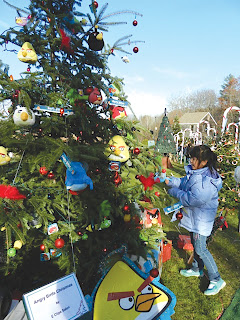By Chip Schrader
Staff Book Critic
“The Polar Express”
In recent years, “The Polar Express” has become the quintessential modern Christmas story, partially because of its screen treatment featuring the voice of Tom Hanks. But, even to become a movie, a book has to be something special; it has to have something other books like it don’t have. Chris Van Allsberg’s illustrations fill a wide frame, and seem to come from the times of Norman Rockwell.
Meanwhile, the story takes us on a magical train trip filled with candy, songs, and holiday spirit as it winds through the strangest places on earth where snow the size of golf balls fall from the sky. As the passengers find themselves at the North Pole to meet Santa and his elves, the journey itself captures the enchantment of childhood and of old time holiday lore.
Reading level: Ages 5 and up. Hardcover: 32 pages. Publisher: Houghton Mifflin; 1st edition (September 28, 2009). (Courtesy book cover image)
“Father Fox’s Christmas Rhymes”
Poetry with its musical rhythms and vivid imagery lends itself to enchanting readers. Clyde Watson’s “Father Fox’s Christmas Rhymes” consists of a series of poems that describe different winter and holiday themes: cutting a Christmas tree, building a snowman, singing carols and drinking hot cider.
lends itself to enchanting readers. Clyde Watson’s “Father Fox’s Christmas Rhymes” consists of a series of poems that describe different winter and holiday themes: cutting a Christmas tree, building a snowman, singing carols and drinking hot cider.
Like “The Polar Express,” the festive spirit of the holidays is captured within these pages: “Here it is, the perfect tree/A prettier sight there cannot be/It stands majestic with the rest/Trimmed just with snow & a small bird’s nest.”
The rhythm varies from a smooth nighttime cadence that will lull listeners into a pleasant winter slumber, while other poems are brisk and will inspire its audience to run into the snowy outdoors and build a snowman. From fun to cozy, this book nicely captures the winter spirit, and is best read aloud to room full of adults and children. A fireplace is optional.
Hardcover: 40 pages. Publication Date: October 2, 2003. (Courtesy book cover image)
“Strega Nona’s Gift”
Sometimes the element that makes the holiday story unique is the way different cultures have their own traditions. “Strega Nona’s Gift” by Tomie dePaola covers all of the holidays that span the month of December according to the traditional Roman Catholic calendar. Starting on December 6 with the Feast of San Nicola (Saint Nicholas), and ending on January 6 with Epiphany.
In traditional Italian homes there are several feasts observing various saints, and Strega Nona carefully observes the dietary traditions of each feast. For Christmas Eve, the cuisine is all fish. On the eve of Epiphany, there are “carrots for the rabbits, corn cakes for the peacock, sweet seeds for the dove, and turnips stuffed with greens and ceci for the goat.” Animals are fed during this occasion because their breath kept the baby Jesus warm in the manger.
Through retelling all of these traditions, dePaola teaches readers why we view Christmas as a season, rather than a solitary holiday. The illustrations fill the pages with color and sweet characters that adults and children will relate to. Strega Nona is an enduring character with endless story potential because she is that classic Italian grandmother many of have the blessing to miss, while others long to have one.
Reading level: Ages 5 and up. Hardcover: 32 pages. Publisher: Nancy Paulsen Books (October 18, 2011). (Courtesy book cover image)
“Runaway Dreidel”
The best of all of these titles is in celebration of Hannukah, and will charm readers of all faiths. “Runaway Dreidel,” written by Lesléa Newman and illustrated by Kyrsten Brooker, begins with “’Twas the first night of Chanukah and on the fifth floor, There was a holiday hustling and bustling galore.” Suddenly, the main character’s dreidel starts spinning uncontrollably, shooting past his visiting family and into the streets of a charming old world, passing the synagogue, markets and into the countryside.
Setting the story to verse, and using the meter and theme of “’Twas the Night Before Christmas,” sets this story up to have that holiday cheer and warmth we crave this time of year. From there, those who grew up in the Christian faith will appreciate the familiarity and clever word play to adapt a Christmas classic to a modern Jewish tale.
The most striking elements of this story include references to Yiddish foods and symbolism, a majestic journey through a time that seems long passed, but most of all, the illustrations are amazing. Looking as if they are paintings on carved wood, the scenes are so quaint, you could feel the chill of the breeze in the story. The shapes are all odd, yet perfect in the way they depict the slightly off kilter story. A must read!
Reading level: Ages 4 and up. Paperback: 32 pages. Publisher: Square Fish (October 2, 2007). (Courtesy book cover image)
While some children’s writers take a chance at adding to our holiday tradition, it is no simple task. “The Polar Express” is likely the best story since Charles Dicken’s “A Christmas Carol,” and nearly one hundred years separate these tales. To make a winter classic is the tallest order a writer can try. “Runaway Dreidel” comes the closest to filling that tall order, and perhaps it is time for an animated holiday film that takes us on a “spin” through Jewish culture.
 PORTSMOUTH—
PORTSMOUTH—












